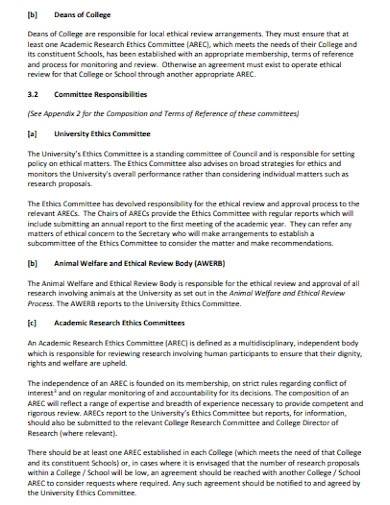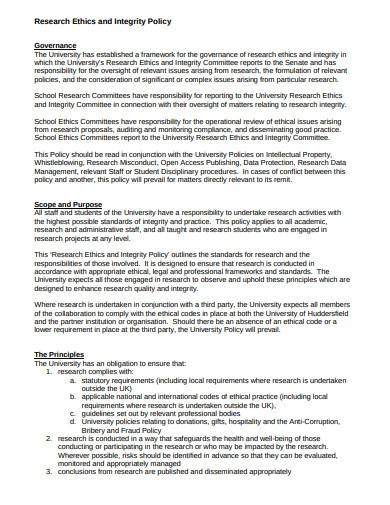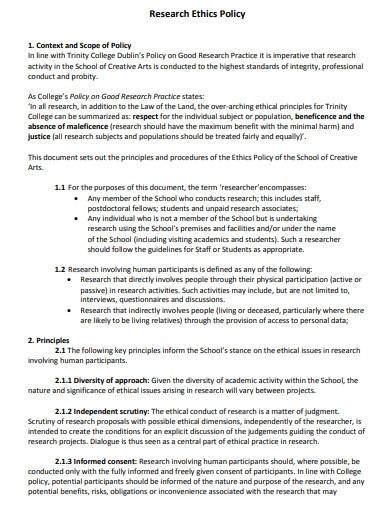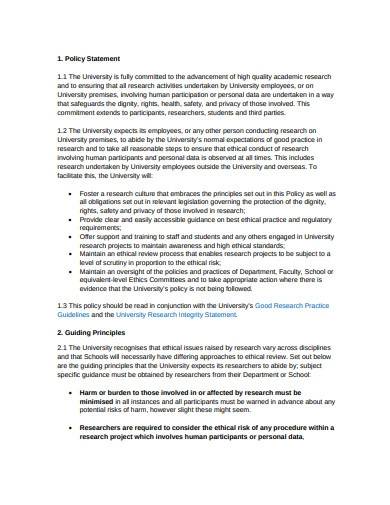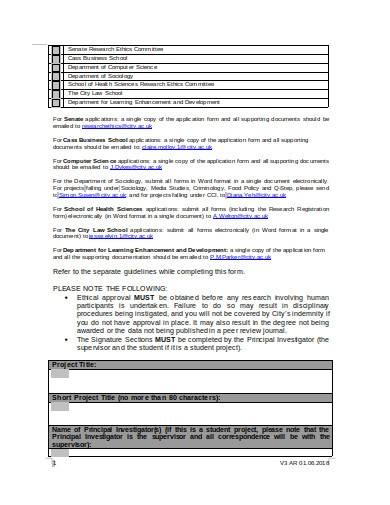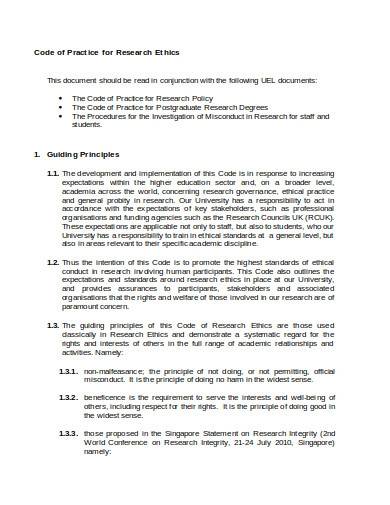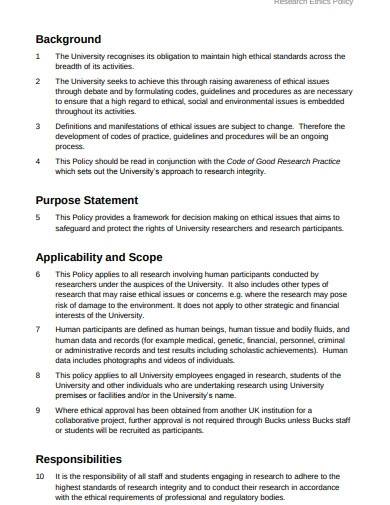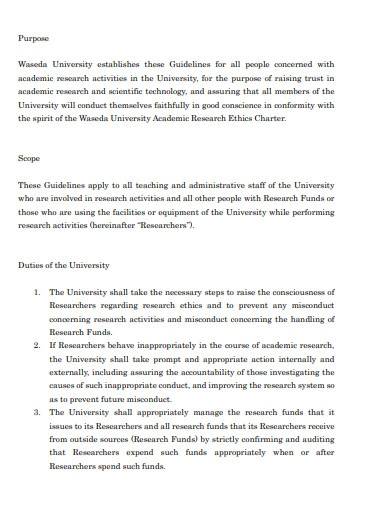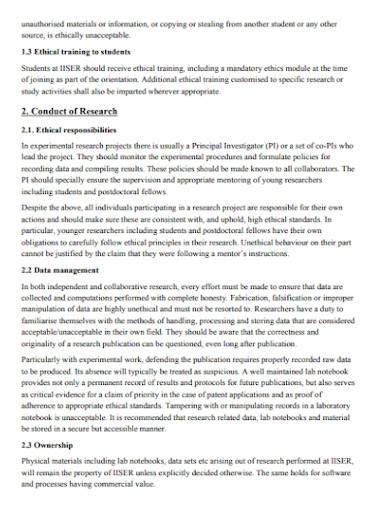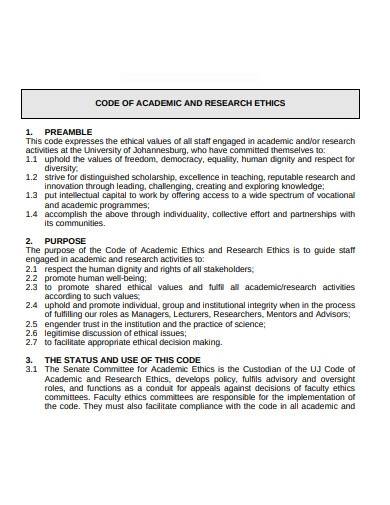Academic research ethics involve a range of issues, such as the protection of human and animal subjects, the management of conflicts of interest, the responsible conduct of research, and the reporting of research findings. These issues are guided by various ethical codes and guidelines, such as the Declaration of Helsinki for medical research, the Belmont Report for research involving human subjects, and the Guide for the Care and Use of Laboratory Animals for research involving animals.
FREE 10+ Academic Research Ethics Samples & Templates
1. Academic Research Ethics Template
2. Research Ethics and Integrity Policy
3. Research Ethics Policy Template
4. Academic Research Ethics Policy
5. Sample Academic Research Ethics
6. Code of Practice for Research Ethics in Word
7. Academic Research Ethics Policy
8. Academic Research Ethics Format
9. Formal Academic Ethics Research
10. Academic and Research Ethics
11. Code of Academic and Research Ethics
What is Academic Research Ethics?
Academic research ethics refers to the set of principles and guidelines that govern the responsible conduct of research in academic settings. It encompasses the values, norms, and practices that guide researchers in ensuring the integrity, reliability, and credibility of their research. In general, academic research ethics emphasize the importance of honesty, transparency, and accountability in the research process, as well as the obligation to respect the rights and welfare of research participants and the wider community.
How To Make Academic Research Ethics?
Researchers are expected to adhere to high ethical standards and to follow rigorous procedures to ensure that their research is conducted in a responsible and ethical manner. Academic research ethics is a critical component of the research process, and it is important for researchers to follow ethical guidelines to ensure the integrity and credibility of their work. Here are some key steps to follow to make academic research ethics:
Step 1- Develop Research Question
Before you begin your research, you should have a clear and well-defined research question. This will help you to focus your research and ensure that your work is relevant and meaningful. It is important to be familiar with the ethical guidelines that apply to your research. Depending on the nature of your research, you may need to follow guidelines for the protection of human or animal subjects, for example.
Step 2- Informed Consent
If your research involves human subjects, you must obtain informed consent from participants before collecting any data. This means that you should provide participants with clear information about the nature and purpose of your research, the risks and benefits of participation, and their rights as research participants.
Step 3- Confidentiality
You should take steps to protect the confidentiality and privacy of research participants. This may involve using pseudonyms to protect participants’ identities, using secure data storage systems, and ensuring that research data is only accessible to authorized individuals.
Step 4- Avoid Conflicts
It is important to avoid conflicts of interest that may compromise the integrity of your research. This may involve disclosing any financial or personal relationships that could influence your research. You should conduct your research in a responsible and ethical manner. This may involve ensuring the accuracy and reliability of your data, avoiding plagiarism and other forms of academic misconduct, and adhering to ethical principles of data analysis and reporting.
What are some ethical considerations in academic research?
Ethical considerations in academic research may include issues such as the protection of human or animal subjects, the management of conflicts of interest, the responsible conduct of research, and the reporting of research findings. Other ethical considerations may include issues such as informed consent, confidentiality and privacy, and the ethical use of research data.
How can I ensure that my academic research is ethical?
To ensure that your academic research is ethical, you should familiarize yourself with the ethical guidelines and principles that apply to your research, obtain informed consent from research participants (if applicable), protect confidentiality and privacy, avoid conflicts of interest, practice responsible research, and seek ethical approval (if necessary).
What are some consequences of unethical research?
Unethical research can have serious consequences, including harm to research participants, damage to the reputation of the research community, and the loss of public trust in research. In addition, unethical research may be subject to legal and regulatory sanctions, and may result in the retraction of research findings.
By following these steps, you can ensure that your academic research is conducted in an ethical and responsible manner, and that it contributes to the advancement of knowledge and understanding in your field.
Related Posts
FREE 10+ Content Validity Samples & Templates in PDF
FREE 10+ Construct Validity Samples & Templates in MS Word | PDF
FREE 10+ Code of Human Research Ethics Samples & Templates in MS Word | PDF
FREE 10+ Biography Research Report Samples and Templates in PDF
FREE 10+ System Documentation Samples & Templates in MS Word | PDF
FREE 10+ Process Document Samples & Templates in MS Word | PDF
FREE 10+ Action Research Samples & Templates in PDF
FREE 10+ Longitudinal Research Samples & Templates in PDF | MS Word
FREE 10+ Causal Research Samples & Templates in MS Word | PDF
FREE 10+ Client Discovery Samples & Templates in MS Word | PDF
FREE 10+ Null Hypothesis Samples & Templates in MS Word | PDF
FREE 9+ Product Knowledge Samples & Templates in PDF
FREE 10+ Software Documentation Samples & Templates in MS Word | PDF
FREE 10+ Exploratory Research Samples & Templates in PDF | MS Word
FREE 10+ Experimental Research Samples & Templates in MS Word | PDF

